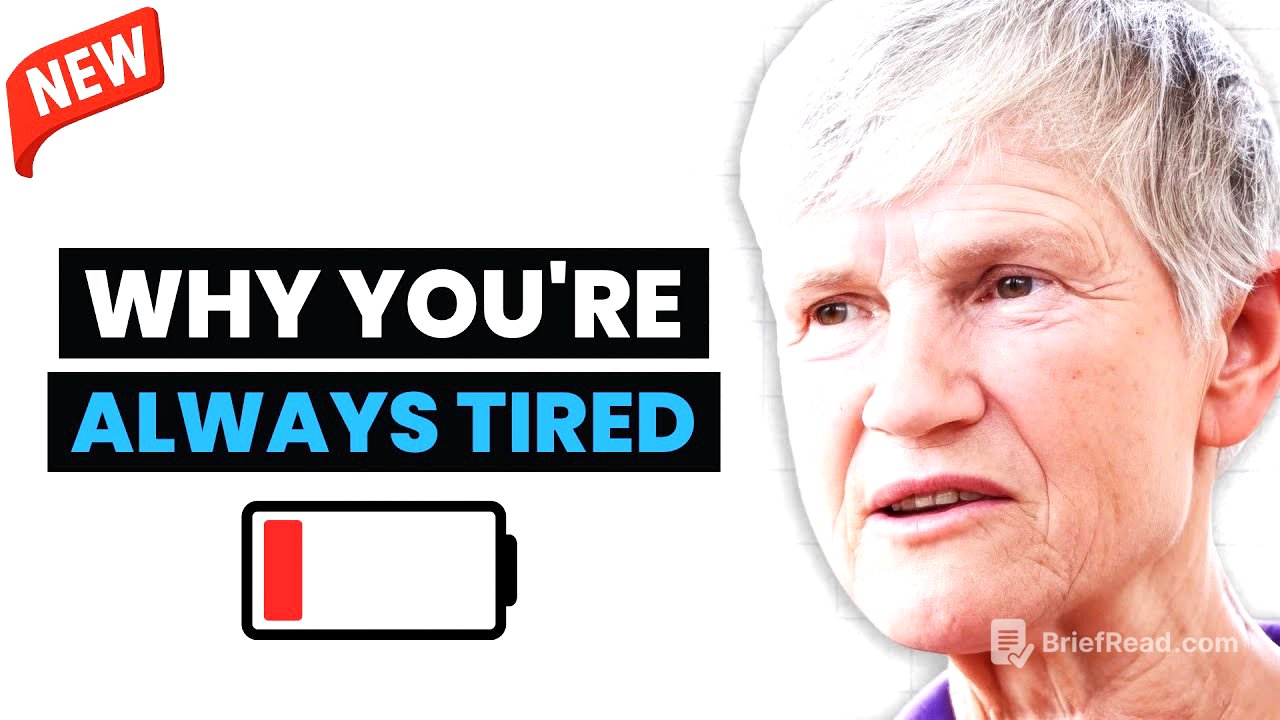TLDR;
This video features a discussion on the root causes of pathological conditions, the importance of energy delivery mechanisms, and practical strategies for improving health and vitality. It covers dietary approaches like the paleo-ketogenic and carnivore diets, the significance of mitochondrial function, and the role of supplements. Additionally, it addresses the impact of toxins on the body and provides detoxification methods.
- Energy delivery mechanisms are at the root of all pathological conditions.
- A paleo-ketogenic or carnivore diet can help address sugar and carbohydrate addiction.
- Vitamin C, iodine, and MSM are key supplements for combating upper fermenting gut issues.
- Detoxification through diet and heating regimes is crucial for overall health.
Intro [0:00]
The speaker emphasizes that energy delivery mechanisms are fundamental to preventing and reversing various pathological conditions, including dementia, cancer, and heart disease. Aerobic energy production via mitochondria is far more efficient than anaerobic production, which generates lactic acid and inhibits mitochondrial function. The speaker recommends five supplements for addressing pathological fatigue and highlights the importance of energy for life and overall health.
The root cause of pathological conditions [0:57]
The principles for treating fatigue apply universally, from those with pathological fatigue to athletes seeking performance improvement. Pathological fatigue is defined as experiencing negative consequences the following day due to energy expenditure. Energy delivery mechanisms are crucial for preventing and reversing conditions like dementia, cancer, and heart disease. The speaker uses a car analogy to explain these mechanisms: diet and gut function as fuel, breathing techniques for oxygen, mitochondria as the engine, the thyroid as the accelerator, and adrenals as the gearbox. Addressing diet and gut function is the first and most challenging step, primarily due to sugar and carbohydrate addiction.
We can’t make vitamin C and we need it [27:29]
Humans, fruit bats, and guinea pigs are unique in their inability to produce vitamin C. While vitamin C can be obtained from meat, it's essential to supplement. Vitamin C can be used in small doses to prevent scurvy, in higher doses for optimal biochemical function, and in super high doses as an antimicrobial and antifungal agent. The speaker recommends taking five grams of vitamin C daily in a glass of warm water in the morning to sterilize the upper gut. At night, three drops of Lugol's iodine in water are suggested to contact-kill microbes, acting as a potent antiseptic.
Do we actually need fiber for the microbiome? [39:20]
The quality of the microbiome improves on a carnivore diet, despite the lack of fiber. Eating organic food is crucial due to the toxicity of glyphosate, a widely used pesticide. Glyphosate harms the microbiome, and many studies don't account for this factor. Bacteria in the microbiome thrive on the waste products of other bacteria, creating a rich environment even without diverse fibers. Animal foods have lower levels of toxic chemicals compared to vegetables because animals process these toxins.
Low energy? Consider these 5 supplements [51:48]
Mitochondria require the right fuel and raw materials to function optimally. Five key supplements are magnesium (200mg with 10,000 IU of vitamin D), CoQ10 (100mg), niacinamide (1500mg), acetyl-L-carnitine (1 gram), and D-ribose (5-10 grams). Lactic acid, pesticides, volatile organic compounds, and heavy metals can block mitochondrial function, emphasizing the need for detoxification.
Lactic acid: friend or foe? [57:20]
Normally, the body generates 90% of its energy aerobically and up to 10% anaerobically, producing lactic acid. Lactic acid inhibits mitochondria, but athletes with good mitochondrial function can reverse this quickly. In fatigued individuals, lactic acid lingers, causing prolonged pain. For athletes, lactic acid stimulates the production of more mitochondria, which requires rest for muscle recovery and growth. Creatine can also improve mitochondrial function. Exercise for those with chronic fatigue should be paced to avoid delayed fatigue, gradually increasing activity with diet and supplements.
Why Sarah’s a huge fan of MSM [1:04:37]
MSM (methylsulfonylmethane) is a multitasking tool that is safe, cheap, effective, and beneficial. It kills microbes in aerobic environments and acts as a prebiotic in anaerobic environments. MSM improves four-phase or exclusion zone (EZ) water, which is crucial for reducing friction in the gut and improving circulation. MSM also aids in detoxifying heavy metals by enhancing the body's ability to distinguish between friendly and unfriendly minerals.
The protein in milk promotes growth [1:28:50]
Dairy products contain growth promoters, particularly milk protein, which can be problematic for mature adults. Dairy products have a high calcium-to-magnesium ratio, leading to magnesium deficiency, a risk factor for heart issues. Magnesium is essential for heart muscle relaxation and preventing arrhythmias.
How to get rid of toxins in body fat [1:37:08]
Toxins stored in body fat can be eliminated through heating regimes. Applying clean, organic oils like coconut oil and shea butter to the skin helps absorb toxins, which are then shed with skin cells or washed off. It's important to use skin products with edible ingredients to avoid further poisoning the body.









